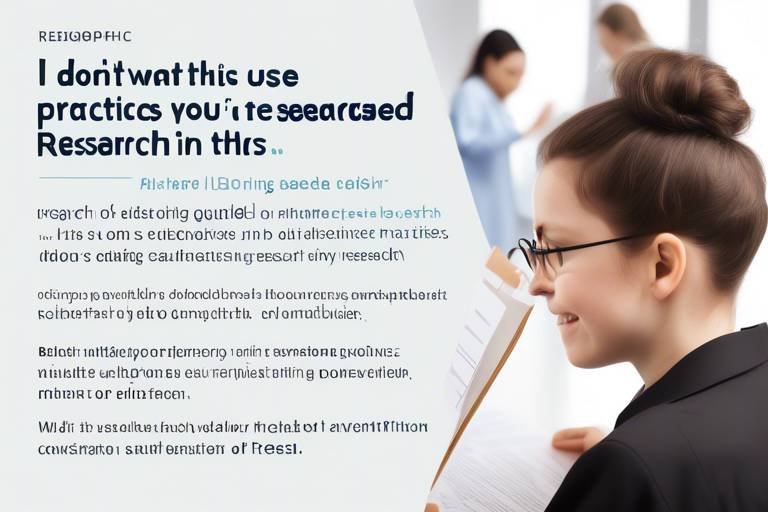The Role of Research Mentoring in Career Development
Research mentoring plays a pivotal role in shaping the career trajectories of individuals, particularly in academic and professional settings. It's not just about passing on knowledge; it's about creating an environment where critical thinking flourishes and research skills are honed. Imagine embarking on a journey with a seasoned navigator by your side, guiding you through the turbulent waters of academia. This relationship is mutually beneficial, as both mentors and mentees share insights and experiences that enrich their understanding and capabilities.
At its core, research mentoring is about fostering a supportive relationship that encourages exploration and innovation. It's like having a personal coach who not only helps you identify your strengths but also challenges you to push beyond your limits. The mentor's experience serves as a roadmap, helping mentees navigate the complexities of their fields while providing a safety net of support. This dynamic not only enhances the mentee's skills but also enriches the mentor's perspective, creating a vibrant exchange of ideas.
Moreover, research mentoring promotes a culture of collaboration and networking. In today's interconnected world, the ability to build professional relationships is crucial. Mentors often introduce their mentees to valuable contacts, opening doors to new opportunities that can significantly impact their careers. Think of it as planting seeds in a garden; with the right nurturing, those seeds can grow into a network of fruitful connections that benefit both parties for years to come.
In summary, research mentoring is a fundamental component of career development that offers a plethora of benefits. From enhancing critical skills to fostering long-lasting professional relationships, the impact of effective mentorship is profound. As we delve deeper into this topic, we will explore the specific advantages of research mentoring, the skills developed through these relationships, and the challenges that may arise, along with strategies to overcome them.
Research mentoring involves guiding individuals in their academic pursuits, fostering critical thinking, and enhancing research skills, ultimately benefiting both the mentee and mentor through shared knowledge and experiences. This relationship is built on trust, respect, and a shared commitment to growth. Mentors often serve as role models, providing insights not only into the technical aspects of research but also into the nuances of navigating academic environments.
Effective research mentoring offers numerous advantages, including increased confidence, improved research capabilities, and enhanced networking opportunities that can lead to career advancement for mentees. When mentees feel supported and valued, their confidence soars, enabling them to take on challenges they might have otherwise shied away from. This newfound confidence can be a game-changer in their academic and professional journeys.
Establishing strong professional relationships is crucial in research mentoring, as these connections can provide valuable support, resources, and collaborative opportunities that enrich the mentee's experience. Strong relationships can lead to collaborative projects, co-authoring papers, and even lifelong friendships. The importance of these connections cannot be overstated; they often serve as the foundation for future career advancements.
Networking through mentoring can open doors to new collaborations, conferences, and job opportunities, significantly impacting a mentee's career trajectory and professional growth. The mentor's network can serve as a powerful tool for mentees, helping them gain visibility in their field and connect with potential employers or collaborators.
Mentoring relationships often extend beyond immediate academic needs, fostering long-term connections that provide ongoing support and guidance throughout a mentee's career. These connections can be invaluable as mentees navigate various stages of their professional lives, offering advice and encouragement when needed most.
Research mentoring plays a vital role in skill development, equipping mentees with essential competencies such as critical thinking, problem-solving, and effective communication necessary for success in their careers. These skills are not only applicable in academic settings but are also highly sought after in the job market. The ability to think critically and communicate effectively can set candidates apart in competitive environments.
While research mentoring is beneficial, it also presents challenges, such as mismatched expectations, time constraints, and communication barriers that can hinder the mentoring relationship. It's essential for both mentors and mentees to communicate openly about their goals and expectations to ensure a productive partnership.
Effective communication is key to successful mentoring relationships; addressing and overcoming communication barriers can lead to more productive and supportive interactions between mentors and mentees. Regular check-ins and feedback sessions can help both parties stay aligned and address any issues that arise.
Time management is critical in mentoring relationships; both mentors and mentees must prioritize their commitments to ensure a fruitful and consistent mentoring experience. Setting aside dedicated time for meetings and discussions can help maintain the momentum of the mentoring relationship.
- What is the primary role of a research mentor? A research mentor guides and supports mentees in their academic and professional pursuits, helping them develop essential skills and navigate challenges.
- How can I find a research mentor? Look for mentors within your academic institution, professional networks, or industry organizations. Attend conferences and workshops to connect with potential mentors.
- What should I expect from a mentoring relationship? Expect guidance, support, and constructive feedback. A good mentor will challenge you while providing the resources you need to succeed.

Understanding Research Mentoring
Research mentoring is more than just a guiding hand; it is a transformative relationship that shapes the academic and professional journeys of individuals. At its core, research mentoring involves a seasoned expert providing direction, insights, and support to a less experienced mentee. This relationship is built on mutual respect and a shared passion for inquiry, knowledge, and discovery. Imagine a seasoned sailor guiding a novice through turbulent waters; this is the essence of research mentoring. It’s about navigating the often-challenging seas of academia and research with someone who has weathered similar storms.
Effective research mentoring fosters critical thinking and enhances research skills, which are crucial in today’s fast-paced world. The mentor not only imparts knowledge but also encourages the mentee to think independently, ask questions, and explore new ideas. This dynamic exchange of knowledge and experiences benefits both parties. While the mentee gains invaluable insights and skills, the mentor also experiences personal growth and satisfaction from sharing their expertise.
Moreover, research mentoring is pivotal in shaping a mentee's career trajectory. It involves not just the transfer of knowledge but the cultivation of a supportive environment where the mentee can thrive. In this nurturing atmosphere, mentees are encouraged to take risks, innovate, and delve deeper into their research areas. This process can be likened to a gardener tending to a young plant, providing the right nutrients and support for it to grow strong and resilient.
In essence, understanding research mentoring means recognizing its multifaceted nature. It encompasses various elements, such as:
- Guidance: Providing direction in research methodologies and academic pathways.
- Support: Offering emotional and professional support during challenging times.
- Feedback: Giving constructive criticism to help the mentee refine their work.
- Networking: Introducing the mentee to professional circles that can enhance their career opportunities.
This comprehensive approach to mentoring not only enhances the mentee's skills but also prepares them for the realities of the academic and professional world. As the mentee develops their research capabilities, they simultaneously build a network of professional relationships that can prove invaluable throughout their career. Ultimately, research mentoring is a powerful tool that equips individuals with the skills, confidence, and connections they need to succeed.

Benefits of Research Mentoring
Research mentoring is not just a buzzword; it's a transformative experience that offers a multitude of benefits for both mentees and mentors. When we think about the journey of academic and professional growth, having a mentor can feel like having a personal GPS guiding you through the complex maze of research and career development. One of the most significant advantages of research mentoring is the increased confidence it instills in mentees. Imagine stepping into a room full of experts, armed with the knowledge and support of a seasoned mentor. That sense of assurance can be a game-changer!
Moreover, effective mentoring improves research capabilities. Mentees get hands-on experience and practical insights that are often not found in textbooks. This real-world exposure helps them develop a robust skill set, including critical thinking and problem-solving abilities. The mentor's role is akin to that of a seasoned chef, teaching the mentee how to blend different ingredients—knowledge, technique, and creativity—to whip up a successful research project.
Another vital benefit of research mentoring is the enhanced networking opportunities it creates. Mentors often have extensive professional networks, and they can introduce mentees to key players in their field. This connection can lead to collaborations, conference invitations, and even job offers. Think of it as being handed a VIP pass to the world of academia and industry, where doors that once seemed closed suddenly swing wide open.
Furthermore, the relationships built through mentoring often extend beyond immediate academic needs. These long-term connections can provide ongoing support and guidance throughout a mentee's career. It's like having a seasoned navigator by your side, ready to offer advice and insight as you chart your course through the ever-evolving landscape of your profession.
In summary, the benefits of research mentoring are profound and far-reaching. From boosting confidence and enhancing research skills to opening up valuable networking opportunities, the positive impact of effective mentoring can significantly influence a mentee's career trajectory. As we delve deeper into the intricacies of research mentoring, it's essential to recognize that while the journey may come with challenges, the rewards of a fruitful mentoring relationship are well worth the effort.

Building Professional Relationships
Building professional relationships is a cornerstone of effective research mentoring. Think of it as planting a garden: you need to nurture the soil, water the plants, and provide sunlight for them to thrive. In the same way, both mentors and mentees must invest time and effort to cultivate a connection that fosters growth and development. A strong mentoring relationship can lead to a wealth of opportunities, not just in academia but across various fields. When mentors take the time to truly understand their mentees' aspirations and challenges, they can offer tailored guidance that resonates deeply.
Moreover, these professional relationships often extend beyond the immediate academic setting. They can evolve into lifelong collaborations that enrich both parties' careers. For instance, a mentor might introduce a mentee to influential figures in their network, opening doors to internships, job opportunities, or collaborative research projects. This is where the magic happens! The mentee gains access to a broader professional landscape, while the mentor benefits from fresh perspectives and innovative ideas brought forth by their mentee.
To illustrate the importance of these relationships, consider the following key elements that contribute to building strong professional ties:
- Trust: The foundation of any meaningful relationship. Both parties must feel comfortable sharing ideas and feedback.
- Communication: Open and honest dialogue is essential for understanding each other's needs and expectations.
- Mutual Respect: Recognizing each other's expertise and valuing their contributions fosters a positive atmosphere.
In addition, mentors can create a supportive environment by encouraging mentees to express their thoughts and concerns. This not only helps in addressing any issues that may arise but also strengthens the bond between them. When mentees feel valued and heard, their confidence grows, and they are more likely to take risks and pursue innovative ideas. The beauty of research mentoring lies in this reciprocal relationship; as mentors guide their mentees, they often learn and grow themselves.
In conclusion, building professional relationships through research mentoring is not just about imparting knowledge; it's about creating a dynamic partnership that fosters growth, innovation, and mutual success. As both mentors and mentees navigate the complexities of their respective fields, these connections can serve as a source of inspiration and support, ultimately leading to a more fulfilling and impactful career journey.
- What is research mentoring? Research mentoring involves guiding individuals in their academic and professional pursuits, helping them develop critical skills and navigate their career paths.
- How can I find a mentor? Look for mentors within your academic institution, professional networks, or industry conferences. It's important to seek someone whose expertise aligns with your interests.
- What are the key benefits of having a mentor? Mentors can provide valuable insights, support, networking opportunities, and guidance that can significantly enhance your career trajectory.
- What should I do if I feel my mentoring relationship isn't working? Openly communicate your concerns with your mentor. Discussing expectations and needs can help realign the relationship for better outcomes.

Networking Opportunities
Networking through research mentoring is a powerful catalyst for career advancement. Imagine attending a conference where you not only learn about the latest advancements in your field but also meet influential figures who could potentially open doors for you. This is the essence of effective networking, and research mentoring plays a pivotal role in facilitating these connections. When a mentor introduces you to their professional network, it's like being handed a golden key that unlocks numerous opportunities.
One of the most significant benefits of having a mentor is their established connections in the industry. These relationships can lead to various opportunities, such as:
- Collaborative Research Projects: Mentors often have ongoing projects and can invite their mentees to join, providing invaluable hands-on experience and exposure.
- Conference Invitations: Being recommended by a mentor can lead to invitations to prestigious conferences where you can showcase your work and meet industry leaders.
- Job Referrals: Mentors can provide insights into job openings and even refer you to potential employers, significantly enhancing your chances of landing a position.
Furthermore, the connections made through mentoring relationships often extend beyond the immediate academic sphere. For instance, a mentor's former mentees may become valuable contacts in the future, creating a ripple effect of opportunities. This network can lead to collaborations that span across different institutions and industries, enriching your professional journey.
In addition to formal networking opportunities, mentorship can also provide informal settings where you can engage with peers and professionals. Whether it’s through casual coffee meetings, workshops, or social events organized by your mentor, these interactions can foster a sense of community and support that is essential for career growth. Remember, networking is not just about what you can gain but also about building lasting relationships where you can give back and support others in their journeys.
In conclusion, the networking opportunities that arise from research mentoring are invaluable. They not only help you build a robust professional network but also enhance your visibility in your field, paving the way for future success. So, if you're considering a mentor, think about the doors they can open for you. After all, in today's interconnected world, who you know can be just as important as what you know!
- What is research mentoring?
Research mentoring involves guiding individuals in their academic pursuits, helping them develop critical thinking and research skills. - How can mentoring impact my career?
Mentoring can enhance your confidence, improve your research capabilities, and provide essential networking opportunities that can lead to career advancement. - What challenges might I face in a mentoring relationship?
Common challenges include mismatched expectations, time constraints, and communication barriers, but these can often be overcome with open dialogue. - How can I find a mentor?
Look for professionals in your field whose work you admire, attend networking events, and utilize platforms like LinkedIn to connect with potential mentors.

Long-term Connections
In the world of research mentoring, the significance of cannot be overstated. These relationships often transcend the immediate academic environment, evolving into a network of support that can last for years, if not a lifetime. Imagine having a mentor who not only guides you through your academic journey but also stays in touch as you navigate the complexities of your professional life. This is the beauty of long-term connections.
When a mentor invests time and effort into nurturing a relationship, it creates a foundation of trust and mutual respect. This foundation is crucial because it allows both parties to share insights, challenges, and successes openly. Over time, these connections can lead to invaluable opportunities, such as:
- Collaborative Projects: Engaging in joint research or publications that can enhance both the mentor's and mentee's portfolios.
- Job Recommendations: Having a mentor vouch for you can significantly improve your chances of landing a job or promotion.
- Continued Learning: Mentors often share resources, workshops, and conferences that keep mentees informed and engaged in their field.
Moreover, long-term connections foster a sense of belonging within the academic and professional community. When mentees feel supported, they are more likely to take risks, explore new ideas, and contribute meaningfully to their fields. This ongoing relationship not only benefits the mentee but also enriches the mentor's experience, as they gain fresh perspectives and renewed enthusiasm from their mentees.
In essence, the journey of research mentoring is not just about the immediate gains; it’s about cultivating relationships that can lead to lifelong partnerships and a rich tapestry of shared experiences. These connections can be the difference between a solitary career path and a vibrant, collaborative professional journey.
What is the primary benefit of long-term connections in research mentoring?
Long-term connections provide ongoing support, collaboration opportunities, and resources that enhance both the mentor's and mentee's professional growth.
How can I maintain a long-term connection with my mentor?
Regular communication, sharing updates on your career, and expressing gratitude for their guidance can help maintain a strong relationship.
Can long-term connections lead to job opportunities?
Absolutely! Mentors often have extensive networks and can provide job recommendations or introduce mentees to potential employers.
What should I do if my mentoring relationship ends?
Don’t hesitate to reach out to your mentor occasionally. A simple check-in can keep the relationship alive and may lead to future collaborations.

Skill Development through Mentoring
This article explores the significance of research mentoring, its impact on career trajectories, and the essential skills developed through effective mentorship in academic and professional settings.
Research mentoring involves guiding individuals in their academic pursuits, fostering critical thinking, and enhancing research skills, ultimately benefiting both the mentee and mentor through shared knowledge and experiences.
Effective research mentoring offers numerous advantages, including increased confidence, improved research capabilities, and enhanced networking opportunities that can lead to career advancement for mentees.
Establishing strong professional relationships is crucial in research mentoring, as these connections can provide valuable support, resources, and collaborative opportunities that enrich the mentee's experience.
Networking through mentoring can open doors to new collaborations, conferences, and job opportunities, significantly impacting a mentee's career trajectory and professional growth.
Mentoring relationships often extend beyond immediate academic needs, fostering long-term connections that provide ongoing support and guidance throughout a mentee's career.
Research mentoring plays a vital role in skill development, equipping mentees with essential competencies such as critical thinking, problem-solving, and effective communication necessary for success in their careers. When a mentor shares their wealth of knowledge, it’s like opening a treasure chest of skills that the mentee can use to navigate their professional journey. For instance, critical thinking is not just about analyzing data; it’s about questioning assumptions, evaluating evidence, and making informed decisions. This skill is invaluable in both academic and workplace settings, allowing mentees to tackle complex problems with confidence.
Moreover, mentoring provides a unique platform for developing problem-solving skills. Mentees often encounter challenges that require innovative solutions. A mentor can guide them through these challenges, offering insights that encourage out-of-the-box thinking. It’s akin to having a seasoned navigator on a treacherous sea, helping the mentee steer clear of potential pitfalls while discovering new routes to success.
Effective communication is another cornerstone of skill development in research mentoring. The ability to articulate ideas clearly and persuasively is crucial in any field. Through regular interactions, mentees learn how to convey their thoughts effectively, whether in written reports or verbal presentations. This practice not only boosts their confidence but also prepares them for future interactions with peers, supervisors, and stakeholders.
Additionally, mentoring relationships often involve goal-setting and feedback, which are essential for personal and professional growth. Mentors can help mentees set realistic goals and provide constructive feedback, creating a roadmap for success. This process is similar to a coach training an athlete; the mentor helps the mentee refine their skills and strategies, pushing them to reach their full potential.
In conclusion, the skill development fostered through research mentoring is multifaceted and profoundly impacts a mentee’s career trajectory. By nurturing critical thinking, enhancing problem-solving abilities, and improving communication skills, mentors equip their mentees with the tools they need to thrive in their chosen fields. The journey of mentorship is a collaborative adventure, where both parties learn and grow, making it a truly rewarding experience.
While research mentoring is beneficial, it also presents challenges, such as mismatched expectations, time constraints, and communication barriers that can hinder the mentoring relationship.
Effective communication is key to successful mentoring relationships; addressing and overcoming communication barriers can lead to more productive and supportive interactions between mentors and mentees.
Time management is critical in mentoring relationships; both mentors and mentees must prioritize their commitments to ensure a fruitful and consistent mentoring experience.
- What is research mentoring? Research mentoring is a relationship where an experienced individual guides a less experienced person in their academic and professional pursuits, enhancing their skills and knowledge.
- How can I find a mentor? You can find a mentor by networking within your academic or professional circles, attending industry events, or reaching out to professors and professionals in your field.
- What are the qualities of a good mentor? A good mentor should be knowledgeable, approachable, supportive, and willing to invest time and effort into the mentoring relationship.
- How long does a mentoring relationship typically last? Mentoring relationships can vary in duration, often lasting from a few months to several years, depending on the goals and needs of the mentee.

Challenges in Research Mentoring
Research mentoring, while incredibly rewarding, is not without its challenges. One of the most significant hurdles is the issue of mismatched expectations. Often, mentors and mentees enter into these relationships with different ideas about what the mentoring process should entail. For instance, a mentor may envision a structured program with regular meetings and set goals, while the mentee might prefer a more informal approach that allows for flexibility. This discrepancy can lead to frustration on both sides, making it essential to establish clear communication from the outset.
Another challenge that frequently arises is time constraints. Mentors are often busy professionals juggling their own research, teaching responsibilities, and personal lives, which can limit the time they can devote to mentoring. Similarly, mentees may have their own commitments, including coursework, jobs, or family responsibilities. This can create a situation where neither party feels they are getting the most out of the relationship. To combat this, both mentors and mentees should prioritize their schedules and set aside dedicated time for their interactions, ensuring that the mentoring relationship remains productive and impactful.
Communication barriers also pose a significant challenge in research mentoring. Effective communication is the backbone of any successful mentoring relationship, yet misunderstandings can easily arise due to differences in communication styles or levels of expertise. For example, a mentor might use jargon or technical language that the mentee does not fully understand, leading to confusion and a lack of engagement. To overcome this, both parties should strive for clarity and openness in their discussions. Regular check-ins can help ensure that both mentor and mentee are on the same page and can address any concerns before they escalate.
Moreover, it’s important to recognize that the dynamics of the mentor-mentee relationship can change over time. As the mentee grows more independent and develops their own research style, the mentor may need to adapt their approach. This evolution can sometimes lead to feelings of uncertainty or insecurity, especially if the mentor feels that they are no longer needed. It’s crucial to foster an environment where both parties feel comfortable discussing their evolving roles, allowing for a more fluid and supportive relationship.
In summary, while the challenges in research mentoring can be daunting, they are not insurmountable. By establishing clear expectations, managing time effectively, and maintaining open lines of communication, both mentors and mentees can create a productive and enriching mentoring experience. The rewards of successful research mentoring far outweigh the difficulties, ultimately paving the way for significant professional growth and development.
- What should I do if my mentor and I have different expectations?
It's essential to have an open conversation with your mentor to align your goals and expectations. Regular check-ins can help keep both parties on the same page. - How can I effectively manage time as a mentor or mentee?
Consider setting a regular meeting schedule that works for both of you. Prioritizing these meetings can help ensure that the mentoring relationship remains a focus. - What if communication barriers arise?
Address any misunderstandings immediately and strive for clarity in your discussions. Don't hesitate to ask for clarification when needed.

Overcoming Communication Barriers
Effective communication is the backbone of any successful mentoring relationship. However, despite the best intentions, barriers can arise that hinder meaningful dialogue between mentors and mentees. These barriers can stem from various sources, including differences in communication styles, cultural misunderstandings, or even the sheer busyness of both parties involved. So, how can we break down these walls and foster a more open and productive exchange of ideas?
First and foremost, it's essential to establish clear expectations at the outset of the mentoring relationship. This means discussing how often you will communicate, the preferred methods of communication (e.g., email, video calls, or face-to-face meetings), and what each party hopes to achieve. By setting these parameters, both the mentor and mentee can align their goals and reduce the chances of miscommunication.
Another effective strategy is to actively listen. Listening is not just about hearing words; it's about understanding the underlying messages. When mentors and mentees practice active listening, they show respect for each other's perspectives, which can significantly enhance the quality of their interactions. This involves asking clarifying questions and summarizing what the other person has said to ensure comprehension. For instance, a mentor might say, "So what I hear you saying is that you're struggling with time management. Is that correct?" This approach not only clarifies understanding but also encourages a more open dialogue.
Moreover, utilizing technology can help bridge communication gaps. For example, if face-to-face meetings are challenging due to geographical distances, consider using video conferencing tools like Zoom or Skype. These platforms can provide a more personal touch than emails or texts, allowing for better non-verbal communication cues. Additionally, project management tools like Trello or Asana can help keep both parties on the same page regarding tasks and deadlines, further reducing the likelihood of miscommunication.
Lastly, it’s important to remain patient and flexible. Communication styles may differ, and it may take some time to find a rhythm that works for both mentor and mentee. If misunderstandings occur, addressing them promptly and constructively can prevent them from escalating into larger issues. Remember, the goal of mentoring is to foster growth and learning, and overcoming communication barriers is a crucial step in that journey.
- What are some common communication barriers in mentoring relationships?
Common barriers include differences in communication styles, cultural misunderstandings, and time constraints. - How can I improve my communication as a mentor or mentee?
Establish clear expectations, practice active listening, utilize technology, and remain patient and flexible. - Why is active listening important in mentoring?
Active listening fosters understanding and respect, which enhances the quality of interactions and helps prevent misunderstandings.

Managing Time Constraints
In the world of research mentoring, time is often a precious commodity that can slip through the fingers of both mentors and mentees. The reality is that both parties are usually juggling multiple responsibilities, from teaching and conducting research to personal commitments. This juggling act can lead to stress and inefficiency if not managed wisely. So, how can mentors and mentees navigate these time constraints without sacrificing the quality of their mentoring relationship?
First and foremost, it’s essential to establish clear expectations from the very beginning. Both the mentor and mentee should openly discuss their availability, preferred communication methods, and the frequency of meetings. This transparency can help prevent misunderstandings and ensure that time is used effectively. For instance, if a mentor has limited availability due to research deadlines, it’s crucial for them to communicate this upfront, allowing the mentee to adjust their expectations accordingly.
Another effective strategy is to prioritize and set specific goals for each mentoring session. By defining what needs to be accomplished during each meeting, both parties can ensure that their time together is productive. This might include discussing particular research challenges, reviewing progress on projects, or exploring new ideas. A simple agenda can make a world of difference. For example:
| Agenda Item | Time Allotted | Objective |
|---|---|---|
| Review of Current Research | 15 minutes | Assess progress and identify challenges |
| Discuss Future Goals | 10 minutes | Set actionable next steps |
| Networking Opportunities | 5 minutes | Identify potential collaborators or conferences |
Additionally, both mentors and mentees can benefit from leveraging technology to stay organized. Tools such as shared calendars, project management apps, and communication platforms can facilitate better time management. For instance, using a shared Google Calendar can help both parties keep track of their commitments and schedule meetings at mutually convenient times.
Lastly, flexibility is key. Life can be unpredictable, and sometimes, plans need to change. A successful mentoring relationship is built on understanding and adaptability. If a mentor is unable to meet due to unforeseen circumstances, it’s important for them to communicate this as soon as possible and suggest alternative arrangements. Similarly, mentees should feel comfortable rescheduling if they find themselves overwhelmed with deadlines.
In summary, managing time constraints in research mentoring requires a combination of clear communication, goal-setting, technological support, and flexibility. By prioritizing these aspects, both mentors and mentees can cultivate a productive and rewarding relationship that enhances their academic and professional journeys.
- What should I do if my mentor is not responsive?
It’s important to communicate your concerns directly. If you feel comfortable, express your need for more guidance. Sometimes, mentors may be unaware of their availability issues. - How often should I meet with my mentor?
Meeting frequency can vary based on individual needs, but a good starting point is once every two weeks. Adjust based on how much support you need. - What if I feel overwhelmed during the mentoring process?
Don’t hesitate to share your feelings with your mentor. They can help you prioritize and find manageable steps moving forward.
Frequently Asked Questions
- What is research mentoring?
Research mentoring is a guiding relationship where experienced individuals help mentees navigate their academic pursuits. It focuses on developing critical thinking, enhancing research skills, and sharing knowledge to benefit both parties involved.
- How does research mentoring benefit my career?
Effective research mentoring can significantly boost your career by increasing your confidence, improving your research capabilities, and providing valuable networking opportunities. These benefits can lead to job offers, collaborations, and advancements in your field.
- What skills can I develop through research mentoring?
Through research mentoring, you can develop essential skills such as critical thinking, problem-solving, and effective communication. These competencies are crucial for success in both academic and professional environments.
- How can I build strong professional relationships with my mentor?
Building strong professional relationships involves open communication, mutual respect, and a willingness to learn from one another. Actively engaging with your mentor and seeking feedback can help strengthen this bond.
- What are some common challenges in research mentoring?
Common challenges include mismatched expectations, time constraints, and communication barriers. Addressing these issues early on can lead to a more productive and supportive mentoring relationship.
- How can I overcome communication barriers in mentoring?
To overcome communication barriers, prioritize open and honest discussions. Regular check-ins and setting clear expectations can help both mentors and mentees stay aligned and foster a better understanding of each other's needs.
- What should I do if my mentor is too busy?
If your mentor is too busy, consider scheduling regular meetings in advance and being flexible with your time. You can also explore additional resources or seek advice from other mentors to supplement your learning.
- Can mentoring relationships extend beyond academic needs?
Absolutely! Many mentoring relationships evolve into long-term connections that provide ongoing support, guidance, and collaboration throughout your career, which can be invaluable as you progress professionally.



















